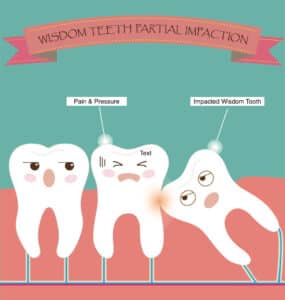Wisdom Teeth Removal Sydney


Wisdom Teeth
Wisdom teeth erupt the last, in individuals, in their later teens years or their early twenties or even much later than that, or in some cases, do not erupt at all.
The Wisdom Tooth is one of the 03 molars on the jaws, on each side, upper and lower and is present in all four quadrants.
When properly aligned and in a healthy condition, they are a valuable asset, but if not, then the only remedy is to extract them as misaligned teeth are inaccessible to regular brushing and cleaning thereby creating oral hygiene issues and presenting other conditions.
As wisdom teeth erupt the last when the jaw is already formed, there usually isn’t enough space for them leading to impacted wisdom teeth as the crown may break through the gums, only partially breaking through or remaining buried entirely within the bone.

Wisdom Tooth Pain
If you are suffering from Wisdom Tooth Pain then we can offer solutions that will help mitigate the Wisdom Teeth Pain and extract the Impacted Wisdom Teeth.
Types of Wisdom Tooth Impaction
- Mesioangular Impaction: It is the most common and means the wisdom tooth is angled forward, towards the front of the mouth.
- Vertical Impaction: the tooth is angled backwards, towards the rear of the mouth.
- Horizontal Impaction: It means fully 90 degrees forward.
- Disto-Angulation: In most of the cases, wisdom teeth with disto-angulation are straightforward to extract in the maxilla and challenging in the mandible.
FAQ's - Wisdom Tooth Extraction
Why are they called "wisdom teeth"?
Back in the 17th century, these teeth were called the ‘teeth of wisdom’ as they appeared when you were no longer a child and theoretically wiser. In the 19th century, the term ‘teeth of wisdom’ transformed into ‘wisdom teeth. The term probably came as a translation of the Latin dens sapientiae.
Wisdom teeth are vestigial third molars that helped human ancestors to grind plant tissue.
With evolution, the jaws of humans grew smaller than those of our predecessors thereby leading to less space to accommodate these teeth.
Wisdom Teeth Signs & Symptoms
Crooked or Partially Emerged Wisdom Teeth can cause swelling and pain in the surrounding tissues.
Inflammation and Infection may develop in and around the tissue covering the impacted wisdom tooth.
You may notice,
- Swollen red gums
- Pain
- Swelling Of The Surrounding Bone
- A Cyst (Sac Of Fluid) Around The Impacted Wisdom Tooth
- Jaw stiffness
- Uneasiness
- The general feeling of being unwell.
The teeth near the wisdom teeth can also be affected by the inflammation of the gums, swelling of the surrounding bone, and decay if food gets trapped between the wisdom teeth and surrounding teeth.
In some cases, a cyst (sac of fluid) can form around the impacted wisdom tooth, which can destroy the surrounding bone, or damage the surrounding teeth and gums.
Which teeth are the wisdom teeth?
Wisdom Tooth is one of the 03 molars on the jaws, on each side, upper and lower and are present in all four quadrants.
When do wisdom teeth grow?
Wisdom teeth erupt the last in individuals, in their later teens years or their early twenties or even much later than that, or in some cases, do not erupt at all.
Why do you remove wisdom teeth?
When properly aligned and in a healthy condition, they are a valuable asset, but if not, then the only remedy is to extract them as misaligned teeth are inaccessible to regular brushing and cleaning thereby creating oral hygiene issues and presenting other oral conditions.
Do you have to remove wisdom teeth?
Grounds for having your wisdom teeth removed are:
- Tooth Decay
- Gum Infection
- Ulcer
- Pressure pain
- Resorption cavity
- Orthodontic reason/ Crowding
- Cyst formation
Is it better to get wisdom teeth out early?
It is optimal to have the troubling wisdom teeth extracted while you are young.
It is optimal to have the troubling wisdom teeth extracted while you are young.
In young adults, the tooth’s roots have not formed entirely, and the bone surrounding the tooth is softer. Thus it allows for a more straightforward extraction of the tooth.
The risk of harm to the surrounding teeth, bones and nerves is also much less.The risk of harm to the surrounding teeth, bones and the nerves is also much less.
Do i have to get wisdom teeth removed?
Impacted Wisdom Teeth do present issues in most cases, in the form of,
- swelling,
- pain
- irritation
However, if in some cases, these symptoms are not present, even then it is advisable to get them extracted as the surrounding teeth can be subject to risks from the impacted tooth.
If Wisdom teeth aren't causing any trouble do I still need to remove them?
Impacted Wisdom Teeth do present issues in most cases, in the form of swelling, pain or irritation, however, if in some cases, these symptoms are not present, even then it is advisable to get them extracted as the surrounding teeth can be subject to risks from the impacted tooth.
In the dental chair or at the hospital?
Dr Thakkar will access the condition of your tooth, and since all cases are not necessarily difficult or complex and most can be extracted within the dental surgery itself under local anaesthesia; a hospital visit may not be required.
Dr Thakkar can also offer you sedation options like happy Gas or other forms of anaesthesia and sedation to relieve your anxiety during the treatment.
In case, complications are detected during your examination which would require extraction in a daycare/hospital setting, then Dr Thakkar would refer you to a specialist with expertise in that particular complexity.
Wisdom Tooth Extraction Procedure
Wisdom Tooth Extraction is a relatively routine procedure.
- Dr Thakkar will review your dental history, take x-rays, and examine the general health of your mouth and the condition of your wisdom teeth.
- In addition to the local anaesthetic to numb the pain chair-side, Dr Thakkar will provide options of sedation or happy gas/nitrous oxide (otherwise known as “laughing gas”) and an oral sedative.
- Post tooth extraction, the site is cleaned, and any remaining debris is carefully removed.
- The location, if required would be stitched up to aid the healing process.
- Dr Thakkar may ask you to bite down on a piece of gauze for a specified period, to limit any bleeding that may occur and to assist the formation of a blood clot.
First 24 hours:
After surgery, expecting minor bleeding swelling and tenderness in the face and neck are common, as is bruising.
Ice packs and pain medications are prescribed to help ease the pain.
Foods should be restricted to a liquid diet until all the numbness from anaesthesia has worn off.
Eat soft foods for a few days. Also, avoid alcohol if you’re taking narcotic pain medication.
Continue to brush your teeth, but try to avoid the teeth directly neighbouring the extracted tooth. On day two, resume the gentle brushing of your teeth. Avoid the use of commercial mouth rinses as they might irritate the site.
After 24 hours:
Use lukewarm heat packs to treat facial swelling
Wrap the area with a warm and moist hand towel on a 20-minute rotation, till some relief is experienced.
Before meals and before bed, with warm salt water (half a teaspoon of salt in a cup of warm water), rinse your mouth.
Look out for signs of a dry socket.
Post-Operative Care:
After your wisdom tooth extraction, it is essential to follow the instructions; it will promote faster healing and avoid complications.
Some of their recommendations include:
Not disturbing the wound, by avoiding touching the site and chewing on the opposite side of your mouth for the first 24 hours.
Not smoking, as this can encourage bleeding.
Not spitting or using a straw, as this can dislodge the blood clot and cause a dry socket.
Using sterile gauze pads to control the bleeding and promote clot development.
Using a cold pack to reduce swelling.
Avoid demanding activities for a week after the procedure.
Eating soft foods and avoiding hot beverages and spicy foods for a few days after surgery.
Wisdom Tooth Extraction Complications
A typical complication is the lack of blood clot formation which is necessary for the healing to progress. This is called a dry socket, i.e. either there is no formation of a blood clot, or the clot that is formed gets dislodged.
It usually occurs a couple of days or later after the extraction and pain returns, either as mild or in severe form, along with foul mouth odour. However, Only 2 to 5% of people will develop a dry socket. With proper care and rest, a dry socket should heal in 7 to 10 days.
Numbness or altered sensation is a rarer complication of wisdom teeth extraction. Wisdom teeth entrapped in the jawbone are often close to nerves. Sometimes these nerves can be bruised or damaged during the tooth removal process. The result is numbness of the tongue, lip, or chin that can last a few days, weeks, months, or may even be permanent.
Sinus problems can occur as the roots of the upper wisdom teeth are close to the sinuses. In some cases, a sinus may be opened when the tooth is removed. This opening usually helps quickly without infection. However if an infection sets in, more treatment may be necessary.
Other minor short-term complications include difficulty in opening the mouth, excessive bleeding (haemorrhage), lip sores, damage to nearby teeth or fillings, vomiting and a weak jaw.
First & Second Molar Extraction vs. Wisdom Teeth extraction
The wisdom tooth extraction procedure is different from a 1st or a 2nd molar extraction as the latter is relatively straightforward.
Dr Thakkar will take a panoramic X-Ray to visualise the placement and position of the third molars, surrounding teeth, nerves, sinuses and signs of infection or disease.
What Is An Operculectomy?
An operculum usually develops on the lower third molars, or wisdom teeth, and it is more common for individuals in their late teens or early twenties to have the condition since third molars usually erupt at this age.
The overgrowth can make the impacted area and the teeth difficult to clean. Food particles may get trapped and may cause a buildup of bacteria that can lead to an infection in the operculum.
If the operculum becomes swollen and painful, a condition known as pericoronitis, Dr Thakkar may remove the tissue by performing an operculectomy under a local anaesthetic.
Maintaining good dental hygiene to keep an infection from returning is essential.
Nausea from Dental Anxiety?
Dental Anxiety is a regular problem for some patients, while some individuals have a more severe condition called dental phobia.
Some Individuals with dental anxiety may feel uneasy during their dental appointments or may continue feeling anxious even after the procedure is over.
Our surgery mitigates such issues for our patients, please make us aware, and we will provide you with,
- noise-cancelling headphones,
- warm blankets,
- relaxing music,
- recommend breathing exercises that may help you relax and calm during the procedure.
How Much Does Wisdom Teeth Extraction Cost?
Cost is dependent on your conditions.
Factors such as the type of anaesthesia used and the nature of the extraction would have an impact on the overall price of the procedure.
While presenting a treatment plan, Dr Thakkar would submit to you a complete set of cost options.
Check out the rough estimate on our pricing page.


